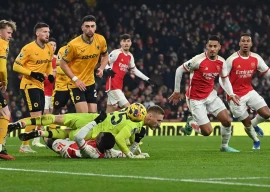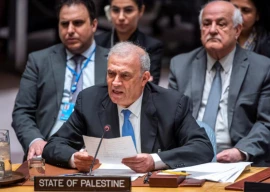
BAGHDAD: While the chances of all-out sectarian war in Iraq appear slim, violence will remain high and at risk of worsening if the country's leaders do not end their political standoff, experts say.
Iraq has suffered several mass-casualty attacks directly targeting communities or sects in the wake of last month's US withdrawal and coinciding with a political row that has pitted the Shiite-led government against the main Sunni-backed bloc.
But though the threat of civil war is often raised in talks on the country's future, analysts say an improved Iraqi security force coupled with greater Sunni Arab participation in politics and popular opposition to communal violence make such a scenario unlikely.
"This conflict between the leaders will continue," Mahmud Othman, an independent MP from the autonomous Kurdish region, told AFP.
"But fortunately, the people are more responsible than the leaders, so I don't think that's a real possibility."
"They (political leaders) have failed the test -- they cannot rule the country, they do not care about national interests ... In the last year, we have had what was called a partnership government, but really it has been a government in crisis."
Othman warned that security in Iraq was "much better at this time last year" and that the attacks would carry on if the political row festered.
Politics and violence are often seen as linked in Iraq, as insurgents exploit political fissures to exacerbate instability.
Shortly after US forces completed their withdrawal on December 18, authorities charged Vice President Tareq al-Hashemi, a Sunni Arab, with running a death squad.
Hashemi's Iraqiya bloc has since largely boycotted parliament and cabinet, while he has stayed put in the autonomous Kurdish region of northern Iraq that has so far declined to hand him over to Baghdad.
In the weeks since the row erupted, Iraq has suffered a spate of violence that has killed more than 200 people, including high-casualty attacks on December 22, January 5 and January 14. The latter two solely targeted Iraq's majority Shia community.
Such attacks, which result in mass deaths, pose a greater threat to security than targeted assassinations that insurgents and militias have pursued in the past because of emotions they stir, according to John Drake, a security analyst with private security firm AKE Group.
AKE figures indicate the number of attacks in the past six weeks are around 50 percent higher than in the same period a year ago, but Drake cautioned that last year's figure did not include the Shiite mourning rituals of Arbaeen or the aftermath of the US pullout.
"It seems to be more violent," the London-based analyst said, and warned: "It's still a fragile political system. ... If people have faith in it, then they will engage in it to resolve their grievances and disputes."
"If they feel the politicians are ineffectual or corrupt or authoritarian, they will try other methods. The methods that are tried and tested in Iraq are tribal methods, which are incompatible with the state, and violence."
Drake added: "I'm not saying that's going to happen, but if they believe it's not in their best interests to participate in the state building process, they could turn against it."
He noted that the strengthening of Iraq's security forces, which now number around 950,000 and are widely acknowledged as more competent and united than between 2005 and 2008, made the risk of civil war unlikely.
In those years, all-out sectarian violence wracked Iraq and tens of thousands of people were killed, levels of violence that only fell when US forces ramped up their numbers and co-opted Sunni tribes.
And whereas then, the police forces in particular were infiltrated by Shia militias, officials now trumpet officers such as army Captain Nazhan Faleh, a Sunni who died trying to wrestle a suicide bomber to the ground as he blew himself up amid a crowd of Shiite pilgrims.
Much of what happens next rests with the decisions of Iraq's Sunni Arab minority, which ruled the country until now-executed dictator Saddam Hussein's ouster in 2003.
Ranj Alaaldin, a senior associate with risk consultancy Certus Intelligence, said civil war was unlikely "because major representatives of the country's Sunni Arabs have no interest in resorting to violence or start collaborating with al Qaeda in Iraq."
"They don't have the same organisational capacity and are divided among themselves," he said. "The Shiites, on the other hand, control the state security institutions and have their own powerful militias."
Reidar Visser, an analyst and editor of the Iraq-focused www.historiae.org website, agreed that any threat of civil war "still seems premature since the Iraqi security forces are so far able to maintain overall stability despite serious terrorism challenges."
He warned, however, that "the greatest threat at this point seems to be the permanent withdrawal of Iraqiya from parliamentary politics, which would mean derailment of the entire post-2003 attempt to establish democracy in Iraq."





























































COMMENTS
Comments are moderated and generally will be posted if they are on-topic and not abusive.
For more information, please see our Comments FAQ